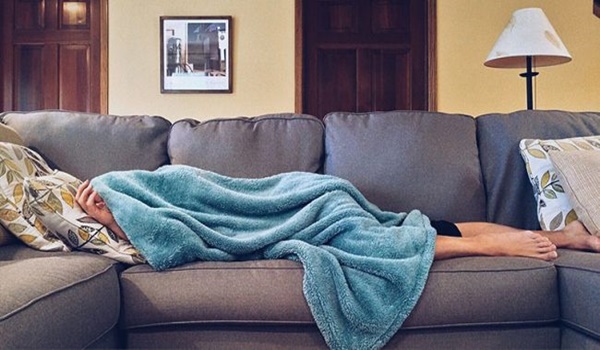No matter what I do during the day, I just love to have a short siesta in the afternoon. Napping is the sweetest time of the day for many people like me, but apparently, it is highly beneficial as well.
This mini-vacation during the day is an easy way to relax and rejuvenate, and give the body the needed boost so it can deal with everything that happened during the day, repair itself and reset for tomorrow.
The lack of sleep can have detrimental effects on our health, but unfortunately, our hectic lifestyles rarely leave time for proper rest.
Chronic sleep deprivation can lead to serious health problems, as sleep is crucial for brain function. Namely, it is linked to increased activity of the sympathetic (fight-or-flight) nervous system. This, in turn, causes chronic stress that affects the metabolism and the circadian rhythm, and leads to chronic systemic inflammation.
This might be the reason behind your depression and anxiety, diabetes and cardiovascular disease, arthritis, weight gain, general body pain, gastrointestinal problems, hormonal imbalance, and infections.
The lack of sleep can also trigger mood disorders, memory issues, and cognitive and performance deficits.
This is why a midday nap can be of great help:
- A study published in the BMJ Journal, Heart, showed that the risk of cardiovascular disease and CVD events was lower in people who napped even just twice per week. Yue Leng, Ph.D., and Dr. Kristine Yaffe, of the University of California, San Francisco, commented: “While the exact physiological pathways linking daytime napping to [cardiovascular disease] risk is not clear. This research] contributes to the ongoing debate on the health implications of napping and suggests that it might not only be the duration, but also the frequency that matters.”
- Numerous scientists claim that 60 to 90 minutes of napping can be as beneficial for the brain as a full night’s sleep. A 2010 Harvard University study showed that even short naps boost memory and learning capabilities
- Bill Anthony, an American psychologist, and director of the Harvard University Psychiatric Rehabilitation Center claims that naps drastically lower cortisol levels in the body. Nowadays, our stress-high lifestyles keep the sympathetic nervous system constantly active, which triggers the release of epinephrine (aka- adrenaline) into your bloodstream, and the levels of cortisol increase.
- Even a short nap in the afternoon boosts alertness and reaction time and helps us become less impulsive and more tolerant of frustration. University of Michigan doctoral student Jennifer Goldschmied explains: “Frustration tolerance is one facet of emotion regulation. I suspect sleeping gives us more distance [from an emotional event] — it’s not just about the passing of time.”
A nap has been found to be even more efficient than caffeine in terms of improving perceptual learning and memory consolidation.
Yet, although you might know all the benefits of napping, you might not have enough time to enjoy a 90-minute nap in the middle of the day. Most experts explain that if you are not sleep deprived, napping for 20-30 minutes is enough to refresh you.
Here is what you can expect from your nap:
- 20-minute nap: Improves mental alertness, memory, and motor learning skills.
- 20 to 30-minute nap: Boosts memory and creativity
- 30 to 60-minute nap: Enhances your decision-making skills and memory
- 60 to 90-minute nap: This is the most beneficial nap, as it ensures REM sleep, restarts the brain, and improves your problem-solving skills.
Choose a dark and quiet room, with a comfortable temperature. Some studies suggest that just spending time in bed can be beneficial, but it is better to try and nap.
Timing is very important, so sleeping for the wrong length of time can lead to sleep inertia, and you will end up feeling groggy and even more tired than before.
Also, aim to nap in the early afternoon, as napping after three in the afternoon can interfere with your night sleep. Just like in the morning, you will need a few minutes to be alert, so allow yourself some time to properly wake up.


